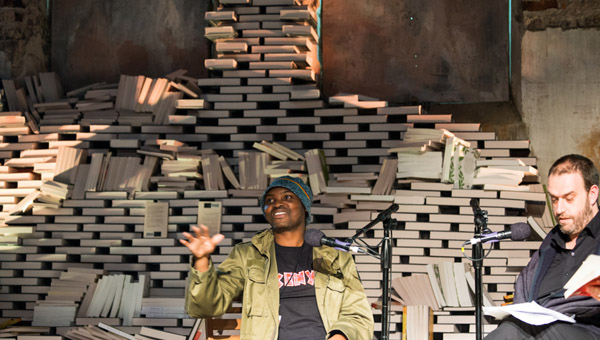Mervyn Sloman interviews Niq Mhlongo, 9 September 2013, Fugard Studio
TEMBI CHARLES
According to Mervyn Sloman, Way Back Home, NiqMhlongo’s third novel, is on “a completely new level”. The atmosphere at the event was one of jovial expectancy as Sloman quizzed Mhlongo, at the beginning of the interview, on why he prefers the name Niq to Nicholas. Mhlongo, who has an insane humour, replied that he had a dream that he would be going to the United States, so he indulged in a bit of self-styling. He replaced the letter c in his name with a q, to force people to pronounce the click. But the truth is that he conceived this name long before he was awarded a fellowship to study creative writing at Iowa University because he felt it would give him an edge. Sloman commented on the irony of Mhlongo’s return to university to “learn how to write” after publishing two novels; Dog Eat Dog in 2004 and After Tears in 2007. Mhlongo explained that he had thought it necessary to study creative writing in order to write like accomplished academics, JM Coetzee, Nadine Gordimer and Zakes Mda. He revealed that he thinks in Zulu and Shangaan, then translates into English in his head before writing. This process made him concerned that he may be “missing something” and would not be able to articulate himself well in English.
Mhlongo was born in Soweto into a multilingual community and grew up speaking Zulu and Sotho at home and Venda and Ndebele when playing with his friends. When asked why he does not write in his mother tongue, Mhlongo replied that he does not have a mother tongue because he has been using all four languages since birth. The issue of language to him is problematic because he also speaks English, which he learnt at school, to other black people. Mhlongo joked that Way Back Home is written in “Zunglish”, a manifestation of thinking in Zulu and writing in English. Sloman commented that Way Back Home is a very serious novel with two different narratives linked together in a variety of ways.
The first is a “brutal narrative” of the early 1980s and, the second depicts Johannesburg’s wealthy society. Sloman reveals that Way Back Home is especially interesting because the link of these two narratives has not been attempted in South African contemporary literature. He asked Mhlongo to comment on his experience of writing the brutal and violent parts of the novel, and Mhlongo replied that it was challenging but that his novel is a reflection of today’s environment. It focuses on the MK cadres, the “returnees” who feel “left out” by the present ANC government. Mhlongo was also interested in exploring the historical narrative that the ANC does not want to tell. In addition the novel confronts the issue of xenophobia and the brutal attacks on foreign Africans. Mhlongo’s impression is that South Africans are forgetting how the rest of the world, especially other Africans, contributed to their struggle for liberation. For his sources, he drew from the experiences of returning MK cadres “the returnees” and also from urban legends, particularly the ones that spoke to African spirituality.
The notion of the existence of ghosts has been present in the imagination of most black South Africans. The urban legend that Mhlongo evoked to explore this theme is the one about a beautiful female prostitute who had lived and died in the 1950s. She is said to have returned as a ghost, seduced men in the night, then abandoned them in the cemetery. Mhlongo explained that, in African spiritual tradition, if the spirit of a dead person is not appeased through cleansing rituals, it returns to haunt the community. Mhlongo incorporates this element into his narrative in the development of the central character, Kimathi.
Kimathi is a wealthy entrepreneur who has been left by his wife due to an affair he had with their domestic worker. He does not pay for his child’s upkeep, but spends most of his money on women and gambling. Although Kimathi is stereotypical, Mhlongo maintains that he represents the new, rich black African man often referred to as “fat cats”, who reside mostly in Johannesburg. Kimathi's character is modelled on many different people and around current events. He is a “returnee” who has been damaged by war physically and emotionally. Mhlongo maintains that Kimathi mirrors South African society today which is “rich on the outside but empty inside”.
In the novel, Kimathi suffers many illnesses which Western medicine cannot cure. Mhlongo offers the character alternative sources of healing in order to illustrate that no one type of medicine is superior to another. In Sloman’s words, “there isn’t a hierarchy or a one or the either [but] a randomness with all the different treatments. It has made me [realise] that traditional beliefs are not reflected in modernist South African literature”. Mhlongo agreed and reiterated that African traditions are perceived to be “out of date”.
In conclusion Mhlongo affirmed that Way Back Home is an allegory of South African society. He is concerned that some South Africans “play victim” of apartheid and yet they, themselves, were perpetrators when living in exile. Mhlongo claims that they have “selective memories” and that they “forget their past deeds in order to live with them.” The novel requires the reader to question whether the so-called rainbow nation exists or if it’s a figment of the imagination.
 SLiPStellenbosch Literary Project
SLiPStellenbosch Literary Project 